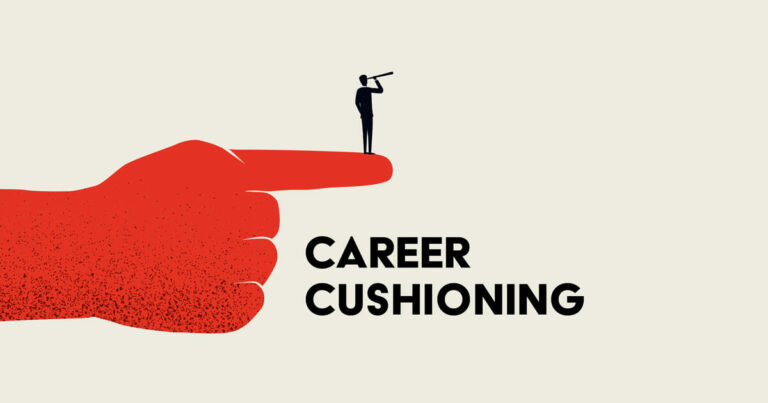Career Cushioning – be prepared to a job loss
December 9, 2022

How career cushioning can help you get ready in case you lose your job. Do you already have Plan B?
It’s called “career cushioning,” and it’s the newest thing to happen at work. It’s being talked about in a different way as professionals prepare for possible layoffs. A recent LinkedIn Workforce Confidence Index found that 85% of American workers are worried about inflation, but only 44% feel ready for a downturn in the economy.
What is career cushioning, and how can it help you get ready for a job loss?
Let’s demystify career cushioning meaning. The term “career cushioning” comes from the world of dating, where people look at other romantic options while still in a serious relationship. But in the business world it means to keep your options open and do things to “cushion the landing” in case something unexpected happens (e.g. you lose your job).
Career Cushioning is a new workplace trend
It’s not surprising that this is happening because more and more companies are letting people go as they prepare for a possible recession caused by high inflation and rising interest rates.
During a rough year for the economy, with sky-high inflation, aggressive interest rate hikes, and a general market drop, companies are laying off more people than ever before.
In the last few months, companies like Amazon, Meta, Robinhood, Shopify, and Microsoft, among others, have cut thousands of jobs.
Employees are wondering if their jobs will be next to go because of all the sudden layoffs. This has led to a new workplace trend called “Career Cushioning” in the wake of layoffs in the tech industry and a general slowdown in the economy.
According to expert, Catherine Fishers, Career Cushioning is a new workplace trend that involves “taking actions to keep your options open and cushioning for whatever comes next in the economy and job market. Think of it like an insurance policy to set yourself up for success.”
Employees are upset because there is more uncertainty in the workplace, and a lot of them are making plans for a Plan B in case they suddenly lose their jobs.
Because of widespread worry, a record number of employees are keeping their resumes up to date and adding new skills to their online portfolios.
In the last year, more than 35 million new skills were added, which is a 43% increase from the year before. This is according to preliminary data from LinkedIn.
Employees are doing everything they can to improve their resumes, like: taking online courses, learning new skills, or teaching themselves a new language. They do this in case the economy crashes suddenly and they need to find a new job quickly.
Even though the Great Resignation and Quiet Quitting workplace trends focused more on employees leaving their jobs because of bad pay or working conditions, career cushioning just helps them be ready for any change that might happen in the next few months.
If you already see the signs that you may have to change jobs soon, it can make you feel like you need a career cushioning even more.
If you feel like you’re being fired or laid off even though you’re doing everything you can to turn things around , it might be best to start getting ready for the worst so you don’t have to start from scratch if you do get laid off.
Career cushioning plan
1. Identify top values
The first step is to make a list of your most important values so you can judge your current and potential employers. Write down your top five work values and put them in order.
2. Build and market your skills
You can also practice career cushioning by getting better at what you already know.
You can use your skills anywhere, and they only make you more valuable at work. It’s also important to tell people about your skills, since that’s what recruiters want to see.
More than 40% of companies around the world use skills to search for and find job candidates. This is 20% increase from the year before. And it used to be that hard skills were more important than soft skills, but that has changed in the last few years. Now, people want soft skills more than ever.
3. Try to get jobs
It’s important to be open to new chances. When you apply for jobs, you might feel like you’re in charge of your career. When you look for a job, you realize that you have options and are not stuck in one job or company.
It also helps you get better at looking for work and going on interviews, so you’ll be ready when you want to find a new job.
Another possibility is that you might find a job that seems “kind of” interesting, but after a few interviews, it turns out to be your dream job.
Lastly, it gives you a chance to grow your network and learn more about the job market and how much people are paid for different jobs.
4. Think about a side job (gig, freelance)
Starting a side business is a great way to make extra money, but it’s also a great way to keep up with trends in your industry, try out a new idea, or “try on” a new career.
It can also give you a chance to be creative if your current job doesn’t let you do what you love.
5. Rebuild and refresh your cv, resume and LinkedIn profile
How to pick a career? Do it now! Think about what you can change and start taking small steps in that direction. You won’t believe how strong you feel. Even the smallest step forward can lead to huge long-term success in a career.
Start with your new resume, refresh your cv , update your LinkedIn profile and make it ATS-friendly. Review all social media profiles to enhance your chances on the job market, build your cv / resume and improve your online portfolio. Seriously consider hiring experts to help you with these tasks. Check our offer and you will not regretted.
If you would like to read more: Forbes
To protect your career, you need to know that your current job won't last forever. People used to spend their whole careers at the same company, but those days are long gone. Why not plan for things to change? Start now with plan B!
When should you start to "cushion" your career?
Career cushioning is the process of making a plan B in case you lose your job. The truth is that job security isn’t guaranteed, no matter how hard you work. Career cushioning means taking steps to keep your options open and give yourself a safety net no matter where the economy goes.
It’s always a good idea to think about where you are in your career and what you can do to improve your skills and get new experiences. If you’re worried about the economy or your field, it might be time to start planning your next steps in your career. If hiring is going down in your field, you might want to start thinking about what you want to do next.


